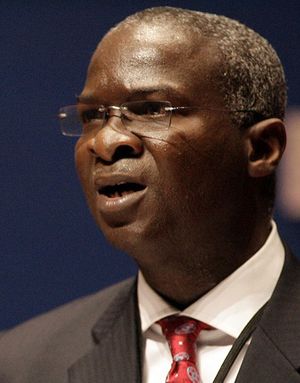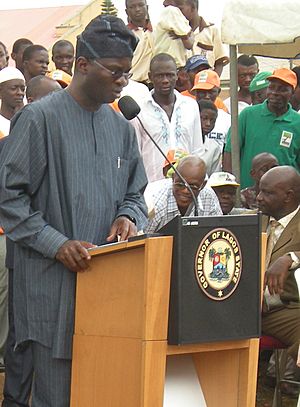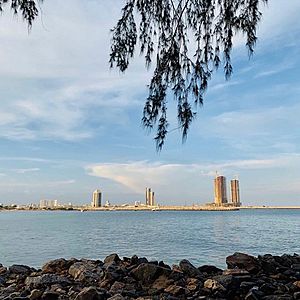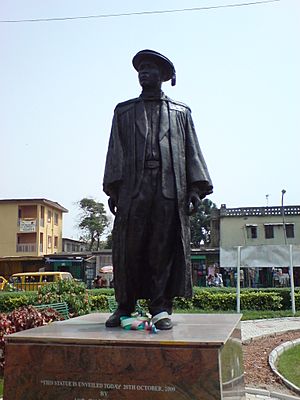Babatunde Fashola facts for kids
Quick facts for kids
Babatunde Fashola
CON SAN
|
|
|---|---|
 |
|
| Minister of Works and Housing | |
| In office 21 August 2019 – 29 May 2023 |
|
| President | Muhammadu Buhari |
| Minister of State |
|
| Preceded by | Himself (as Minister of Power, Works and Housing) |
| Succeeded by | Dave Umahi (as Minister of Works) Ahmed Musa Dangiwa (as Minister of Housing) |
| Minister of Power, Works and Housing | |
| In office 11 November 2015 – 28 May 2019 |
|
| President | Muhammadu Buhari |
| Minister of State | Mustapha Baba Shehuri Suleiman Hassan Zarma |
| Preceded by | Osita Nebo (as Minister of Power) Mike Onolememen (as Minister of Works) Akon Eyakenyi (as Minister of Housing) |
| Succeeded by | Saleh Mamman (as Minister of Power)< Himself (as Minister of Works and Housing) |
| 13th Governor of Lagos State | |
| In office 29 May 2007 – 29 May 2015 |
|
| Deputy |
|
| Preceded by | Bola Tinubu |
| Succeeded by | Akinwunmi Ambode |
| Personal details | |
| Born |
Babatunde Raji Fashola
28 June 1963 Lagos, Nigeria |
| Political party | All Progressives Congress (2013–present) |
| Other political affiliations |
Action Congress of Nigeria (before 2013) |
| Spouse | Abimbola Fashola |
| Children | 2 |
| Occupation |
|
Babatunde Raji Fashola (born June 28, 1963) is a Nigerian lawyer and politician. He served as the federal Minister of Works and Housing of Nigeria from 2019 to 2023. Before that, he was the Minister of Power, Works and Housing from 2015 to 2019. He also served two terms as the governor of Lagos State from 2007 to 2015.
Contents
Early Life and Education
Babatunde Fashola was born on June 28, 1963, in Lagos, Nigeria. His father, Ademola Fashola, was a journalist. His mother, Olufunke Agunbiade, was a nurse. He grew up with 12 siblings.
Legal Career
Fashola became a lawyer in November 1988. He completed his training at the Nigerian Law School in Lagos. He is a solicitor and advocate of the Supreme Court of Nigeria.
Awards and Recognitions
Fashola has received many awards for his work. The University of Benin Alumni Association gave him a Distinguished Alumnus Award. He also received an award from the Lagos State public service club.
He is a Patron of the Law Students Association at the University of Benin. He was the second law graduate from the University of Benin to become a Senior Advocate of Nigeria. This is a special title for experienced lawyers.
In October 2022, President Muhammadu Buhari gave him a national honor. He was named a Commander of the Order of the Niger (CON).
Arbitration Work
In 2008, Fashola became a Fellow of the Nigerian Institute of Chartered Arbitrators. This means he is skilled in helping people resolve disagreements outside of court.
Political Journey
Before becoming governor, Fashola was the chief of staff to the previous governor, Bola Tinubu. He also served as the Honourable Commissioner to the Governor's office at the same time. He was the first person to hold both these important roles.
Fashola held several other positions in Lagos State, including:
- Secretary of the Lands Sub-Committee (1999)
- Member of the State Tenders Board (2002–2006)
- Member of the Lagos State Executive Council (2002–2006)
- Member of the State Security Council (2002–2006)
- Minister of Power, Works and Housing (2015-2019)
- Minister of Works and Housing (2019-2023)
Governor of Lagos State
Fashola became the governor of Lagos State on April 14, 2007. He was a candidate for the Action Congress of Nigeria party, which later became the All Progressives Congress party. He was re-elected for a second term on April 26, 2011.
Improving Lagos's Infrastructure
As governor, Fashola focused on improving Lagos's buildings and roads. Many of these had been neglected for years. He worked with both private companies and the government to modernize the city.
Bus Rapid Transit System
Fashola introduced modern, air-conditioned city buses called BRT buses. Special lanes were built just for these buses to help people travel faster.
Suburban Railway Development
Fashola started building the Lagos Light Rail system. This is a commuter train system for Lagos. The first two lines of this railway were completed in 2022.
Highway Upgrades
When he became governor, Fashola began a major project to fix the city's main highways. Many roads were redesigned and new ones were built with flyover bridges. Old footbridges were replaced with new, modern ones. This greatly improved the look of Lagos.
Focus on Education
Fashola's government paid a lot of attention to education. They built and fixed classrooms and provided free textbooks. They also set up well-equipped workshops and libraries. Buses were provided for teachers and students to make transportation easier.
Rural Area Improvements
The Fashola government also worked on projects in rural areas. Over 110 rural development projects were completed. These included providing water systems and building modern markets. They also built access roads to connect villages and completed many rural electricity projects.
Land Reclamation Projects
Fashola started projects to reclaim land from the sea. This was important for city planning. Two major projects were Banana Island and Eko Atlantic City. Eko Atlantic City is a new city built on reclaimed land. It has modern features like sewers and its own electricity supply.
City Beautification Efforts
In October 2009, Fashola opened a garden in honor of Professor Ayodele Awojobi. A statue of the famous academic was placed in the garden. Fashola also worked with artists to create sculptures that beautified Lagos.
Public Safety and Security
The Fashola government worked to make Lagos safer. They transformed areas that were used by criminals into pleasant environments. They also created the Lagos State Security Trust Fund to help pay for the state's security needs.
In June 2007, Fashola appointed former Inspector General of Police Musiliu Smith to lead the Lagos State Security council. This group worked to understand and reduce crime in the state.
Helping Haiti After Earthquake
After a big earthquake hit Haiti in 2010, Babatunde Fashola started an appeal to raise money. They aimed to raise one million US dollars to help the earthquake victims.
Water Safety Measures
In May 2014, Fashola made it mandatory to wear life jackets on Lagos waterways. This rule was put in place after a tragic accident in 2012 where ten children drowned because they were not wearing life jackets.
Ministerial Roles
Fashola was appointed Minister of Power, Works and Housing by President Muhammadu Buhari on November 11, 2015. Later, on August 21, 2019, he was appointed Minister of Works and Housing.
Major Infrastructure Projects Completed
During his time as minister, several big projects were completed:
- The Second Niger Bridge at Onitsha, which had been discussed for decades, was completed.
- The renovation of the Lagos-Ibadan Expressway was also completed in 2022.
- The motorway between Lagos and Oworonshoki was completed.
- The Lagos Third Mainland Bridge was repaired.
- The motorway between the capital, Abuja, and Kano was completed.
Fashola stated that 800 road contracts had been signed. He mentioned that 13,000 km of roads were being fixed and 37 bridges were being built. He noted that his ministry achieved more with less money over time.
Personal Life
Babatunde Fashola is married to Abimbola Fashola. They have two children.
Legacy
The railway station in the Agege area of Lagos is named after Babatunde Fashola.
See also
 In Spanish: Babatunde Fashola para niños
In Spanish: Babatunde Fashola para niños
- Timeline of Lagos, 2000s–present
- List of governors of Lagos State
- List of Yoruba people
 | Aurelia Browder |
 | Nannie Helen Burroughs |
 | Michelle Alexander |




